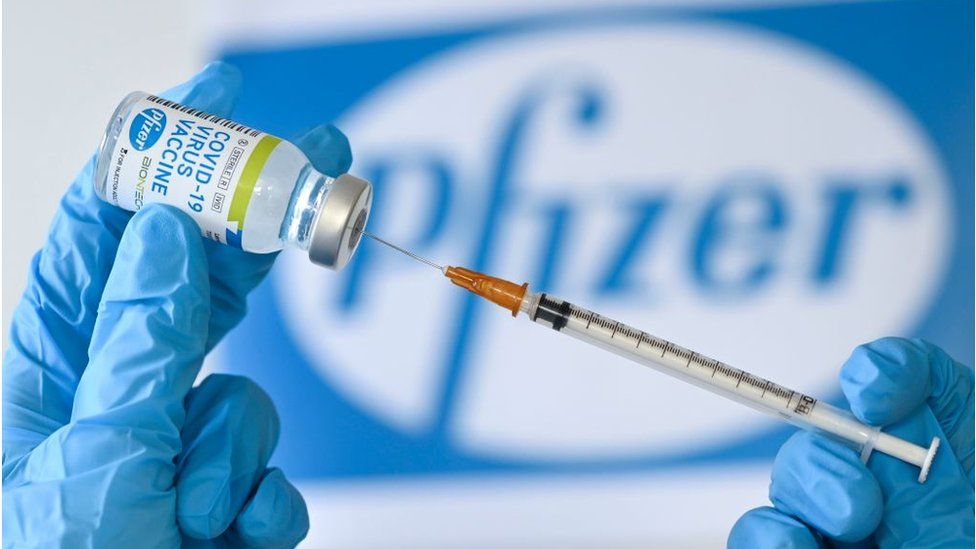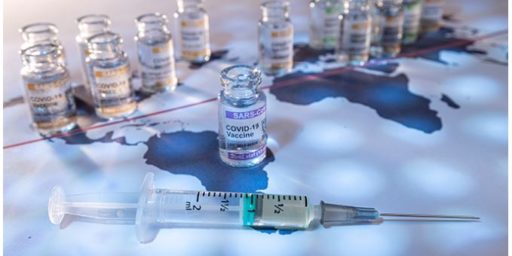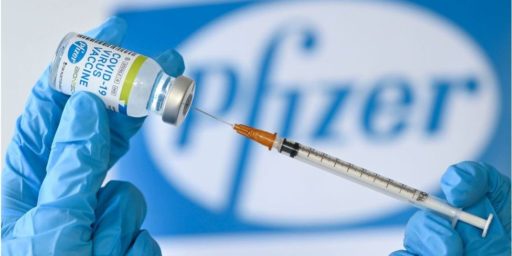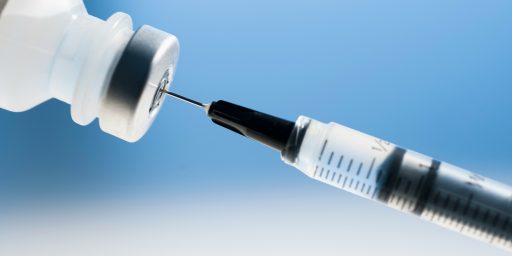Boosters ‘Less Effective’ for Those in Least Danger
Media reporting on CDC findings is, once again, unhelpful.

A truly bizarre take from the New York Times (“Younger Americans Benefited Less From Booster Shots Than Older People“)
The Centers for Disease Control and Prevention on Thursday night published new data on the risks of hospitalization and death from Covid-19 among people who are unvaccinated and vaccinated, with or without booster doses.
The agency recommends booster shots for Americans 12 and older. These are the first comprehensive data on the effectiveness of boosters by age in the United States.
The figures confirm that booster doses are most beneficial to older adults, as the C.D.C. has previously reported. But the new numbers for younger Americans were less compelling. In those age groups, vaccination itself — two doses of the Moderna or Pfizer-BioNTech vaccines, or one dose of the Johnson & Johnson vaccine — decreased the risk of hospitalization and death so sharply that a booster shot did not seem to add much benefit.
The data run only through the end of December, when the Omicron surge had just begun. Because the variant is so highly contagious, booster shots may have helped limit the variant’s spread through the population, an argument for boosters that would not be fully captured in the new research.
Still, several recent studies have found that vaccination alone, without boosters, remained strongly protective against severe illness and death in most people, even after Omicron’s appearance.
The vaccines work quite well but their efficacy degrades over time. But, sure, their value is highest for those most at risk. Even before vaccination was a thing, the virus was comparatively mild for healthy people under 60.
But, even if we ignore community effects and just focus on the personal benefit of the shots, we have to weigh risks and rewards. The rewards, these data seem to show, are relatively modest. But the risks are damned near nonexistent. The most dangerous part is the drive to and from the facility which, in our case, is roughly 15 minutes each way. There’s also the aftereffects of the jab, which include muscle soreness and possibly mild flulike symptoms that last a day or so.
Weighing those odds, getting boosted seemed like a no-brainer. I got boosted in November and my wife followed suit a couple of weeks later; we’re both in our mid-50s. My three stepchildren, ages 22 to 18, are all boosted. I made and missed an appointment a couple of weeks ago to get my 13-year-old boosted and just made a new appointment a few minutes ago for later in the week. The remaining child, my 10-year-old daughter, isn’t yet eligible but I’ll make it happen when she is.
Yes, all of us are in good health and live with relatively low exposure.
My workplace, a Defense Department facility, has been close to 100 percent vaccinated since March. I don’t know the rate of boosting but most of my middle-aged colleagues have gotten a third jab; the rate is likely much less for our students, who are mostly in their 30s. And we’re required to wear masks all day, unless we’re in our private offices or eating or drinking, on top of that.
My wife mostly telecommutes, going in maybe one or two days a month.
My oldest stepdaughter is back on her own, sees her boyfriend regularly, but mostly telecommutes for work. The others are in college, junior high, or elementary school—all of which are requiring masking and various other precautions.
Odds are incredibly low that any of us gets a very serious case of COVID. But they’re even lower with booster shots. As is the likelihood that we’ll be asymptomatic transmitters of the virus.





It should be noted even this is somewhat of a media misrepresentation. If you count efficacy purely as “you can’t get COVID19 at all”, then yes efficacy degrades over time.
If you’re talking about not being hospitalized or dying, then the vaccines appear to hold their efficacy quite well even over long periods.
@Stormy Dragon: I suppose it’s a shorthand but here’s what CDC says:
And here’s an explainer from the folks at Johns Hopkins:
“The vaccines work quite well but their efficacy degrades over time” seems a reasonable lay summary from the top of my head.
I’m not sure what’s so bizarre about the take or the research. Nothing in that study is a surprise.
@Andy: The research confirms what we would have expected even before there was a vaccine: the virus is far more of a threat for people who are old and/or unhealthy. So, naturally, the vaccine is “less effective” for those who are young and healthy. And the booster even less so. But the takeaway shouldn’t be, well, there’s no sense in getting boosted.
@James Joyner:
Sure, but one can’t avoid or hide the fact that there are real differences in risk, and people will consider those differences when deciding what to do.
The benefit:risk ratio of the vaccine is very high at every age. That is largely because the risk of the vaccine is so incredibly low. If that is your metric of choice you should always choose the vaccine. The absolute value of the benefit is much higher when you are older or sick. It decreases quite a bit when you are young and healthy. The odds ratio still favor the vaccine but you arent getting nearly as much benefit. That’s how I think about it.
Left out of this is discussion of risk of transmitting to others. Fully boosted you still have a much lower risk of infecting someone else.
Steve
@James Joyner:
If you click through to the actual data:
https://www.cdc.gov/mmwr/volumes/71/wr/mm7104e3.htm?s_cid=mm7104e3_w
It’s a bit more complex:
1. There has been some falloff in efficacy against hospitalization over time
2. But most of the drop isn’t that the vaccines are lose effectiveness over time, but rather that omicron is better at evading the vaccine whether you just got it or have had it for a while.
3. The booster isn’t just “resetting the clock”, but rather three doses are inherently better: someone who got a third dose months ago is better protected then someone who just got the second dose two weeks ago
So the problem is that by focusing so much on efficacy loss, which is really just a caveat, the media is turning the message from “get vaccinated and boosted” to “vaccines wear off in a few months anyways, so why bother?”
I doubt that is their intended message, but that’s what their failure to communicate is leaving a lot of people understanding.
@Andy:
Sure, but one can’t avoid or hide the fact that there are real differences in risk, and people will consider those differences when deciding what to do.
Sure you can avoid the fact because there’s no downside to getting the vaccine or the booster. There’s no decision to make, and had vaccine skepticism not become part of mainstream politics we would be treating the decision-making process like it came from a pamphlet written by Lyndon LaRouche.
@Modulo Myself: To be fair, I think LaRouche was referring to Prince Philip as a pedophile long before the revelations about his trips to Epstein’s Pedophile Island came to light.
Still waiting on confirmation of the lizard people aspect.
——
Ok, seriously, why did the Republicans reject LaRouche but embrace Q?